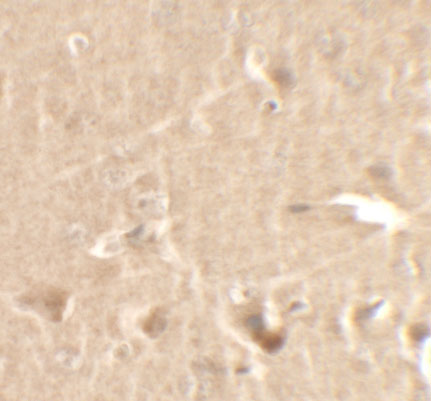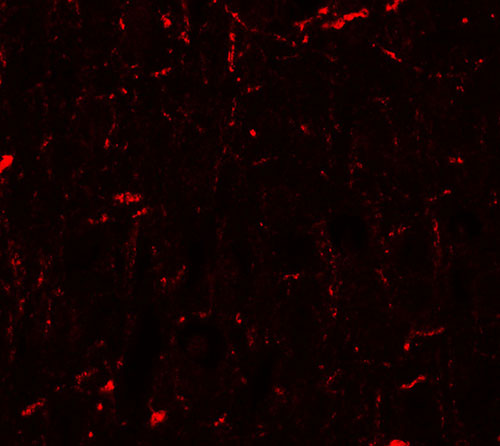CCNT1 Antibody
- SPECIFICATION
- CITATIONS
- PROTOCOLS
- BACKGROUND

Application
| WB, IHC-P, IF, E |
|---|---|
| Primary Accession | O60563 |
| Other Accession | NP_001231, 17978466 |
| Reactivity | Human, Mouse, Rat |
| Host | Rabbit |
| Clonality | Polyclonal |
| Isotype | IgG |
| Calculated MW | Predicted: 80 kDa |
| Application Notes | CCNT1 antibody can be used for detection of CCNT1 by Western blot at 1 - 2 µg/mL. |
| Gene ID | 904 |
|---|---|
| Target/Specificity | CCNT1; |
| Reconstitution & Storage | CCNT1 antibody can be stored at 4℃ for three months and -20℃, stable for up to one year. |
| Precautions | CCNT1 Antibody is for research use only and not for use in diagnostic or therapeutic procedures. |
| Name | CCNT1 |
|---|---|
| Function | Regulatory subunit of the cyclin-dependent kinase pair (CDK9/cyclin-T1) complex, also called positive transcription elongation factor B (P-TEFb), which facilitates the transition from abortive to productive elongation by phosphorylating the CTD (C-terminal domain) of the large subunit of RNA polymerase II (RNA Pol II) (PubMed:16109376, PubMed:16109377, PubMed:35393539, PubMed:30134174). Required to activate the protein kinase activity of CDK9: acts by mediating formation of liquid-liquid phase separation (LLPS) that enhances binding of P-TEFb to the CTD of RNA Pol II (PubMed:29849146, PubMed:35393539). |
| Cellular Location | Nucleus |
| Tissue Location | Ubiquitously expressed. |

Thousands of laboratories across the world have published research that depended on the performance of antibodies from Abcepta to advance their research. Check out links to articles that cite our products in major peer-reviewed journals, organized by research category.
info@abcepta.com, and receive a free "I Love Antibodies" mug.
Provided below are standard protocols that you may find useful for product applications.
Background
CCNT1 Antibody: Cyclins function as regulators of CDK kinases and exhibit distinct expression and degradation patterns which contribute to the temporal coordination of each mitotic event. The cyclin-T1 protein (CCNT1) belongs to the highly conserved cyclin family, whose members are characterized by a dramatic periodicity in protein abundance through the cell cycle. CCNT1 tightly associates with CDK9 kinase, and was found to be a major subunit of the transcription elongation factor p-TEFb. The kinase complex containing CCNT1 and the elongation factor can interact with, and act as a cofactor of human immunodeficiency virus type 1 (HIV-1) Tat protein, and was shown to be both necessary and sufficient for full activation of viral transcription. CCNT1 and its kinase partner were also found to be involved in the phosphorylation and regulation of the carboxy-terminal domain (CTD) of the largest RNA polymerase II subunit.
References
Uhlmann F, Bouchoux C, and Lopez-Aviles S. A quantitative model for cyclin-dependent kinase control of the cell cycle: revisited. Philos. Trans. R. Soc. Lond. B. biol. Sci. 2011; 366:3572-83.
Wei P, Garber ME, Fang SM, et al. A novel CDK9-associated C-type cyclin interacts directly with HIV-1 Tat and mediates its high-affinity, loop-specific binding to TAR RNA. Cell 1998; 92:451-62.
Mancebo HS, Lee G, Flygare J, et al. P-TEFb kinase is require for HIV Tat transcriptional activation in vivo and in vitro. Genes Dev. 1997 ; 11 :2633-44.
Majello B and Napolitano G. Control of RNA polymerase II activity by dedicated CTD kinases and phosphatases. Front. Biosci. 2001; 6:D1358-68.
If you have used an Abcepta product and would like to share how it has performed, please click on the "Submit Review" button and provide the requested information. Our staff will examine and post your review and contact you if needed.
If you have any additional inquiries please email technical services at tech@abcepta.com.













 Foundational characteristics of cancer include proliferation, angiogenesis, migration, evasion of apoptosis, and cellular immortality. Find key markers for these cellular processes and antibodies to detect them.
Foundational characteristics of cancer include proliferation, angiogenesis, migration, evasion of apoptosis, and cellular immortality. Find key markers for these cellular processes and antibodies to detect them. The SUMOplot™ Analysis Program predicts and scores sumoylation sites in your protein. SUMOylation is a post-translational modification involved in various cellular processes, such as nuclear-cytosolic transport, transcriptional regulation, apoptosis, protein stability, response to stress, and progression through the cell cycle.
The SUMOplot™ Analysis Program predicts and scores sumoylation sites in your protein. SUMOylation is a post-translational modification involved in various cellular processes, such as nuclear-cytosolic transport, transcriptional regulation, apoptosis, protein stability, response to stress, and progression through the cell cycle. The Autophagy Receptor Motif Plotter predicts and scores autophagy receptor binding sites in your protein. Identifying proteins connected to this pathway is critical to understanding the role of autophagy in physiological as well as pathological processes such as development, differentiation, neurodegenerative diseases, stress, infection, and cancer.
The Autophagy Receptor Motif Plotter predicts and scores autophagy receptor binding sites in your protein. Identifying proteins connected to this pathway is critical to understanding the role of autophagy in physiological as well as pathological processes such as development, differentiation, neurodegenerative diseases, stress, infection, and cancer.




